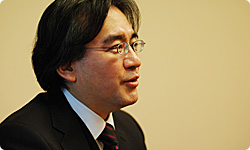2. Satisfying Unexpressed Desires
If you do a rough job on a series like Tales - a series that has enthusiastic fans - their enthusiasm can turn against you. What have you done to avoid that?
The whole staff tries to be sensitive to what the fans don’t like. But you can’t keep up 100%, so it’s challenging.
It isn’t always best to listen only to the fans’ opinions and demands and do whatever they want. Our job is to surprise fans in a good way, so we can’t just listen to their opinions. We have to betray - in a good way - their expectations. We have to satisfy their unexpressed desires. We want them to take the game and say, “Yes, yes, this is what I wanted!”
Right.
But that is a two-edged sword. You run the risk of them saying, “This isn’t what I want from Tales!” If you adopt a conservative stance, however, it will dwindle away. How have you dealt with this for 15 years when it comes to Tales?
We are sensitive to the voices of the fans. But I don’t think our work is simply realising what they want. You don’t make video games by majority vote.
And we live in an amazing time in which the voices of the fans are delivered directly over the Internet. You get words of praise, words of rebuke, and criticism, and you can see what surprised people in a positive way. But while our work is essentially making something that isn’t already out there, if you pay too much attention to those opinions, you will worry about them.
Yeah, they can pull you astray.

The younger staff members are especially prone to that. I would guess that your most important work with regard to Tales is facing those younger staff members who work only to satisfy the customers’ demands and saying, “That alone won’t surprise them.”
Well, I can’t say anything too high falutin’, but I always say, “When you aren’t sure what to do, think about what you would prefer if you were the player.” I want them to work for the individual rather than the many. If you listen to the fans’ voices too much, that will sway you, so I basically say, “Do what seems best to you.”
When a game delivers pleasant surprises, the players can’t help but grin. I think high quality entertainment does that over and over. If everything rolls along like clockwork, it isn’t satisfying.
That’s right. I want to remove all traces of the developers’ circumstances.
But every time you believe you’ve taken the right path and what you’ve made goes out into the world, you feel like praying, right?
Yeah. It’s terrifying.
It always is. That’s because it’s a battle against the unknown. You’re releasing something you’ve thought your brains out over, but you don’t always hit the target when it comes to the players’ responses. But if you make something by majority vote, it won’t be any fun.

That’s right. People always talk about surveys and marketing - and you can make good use of such things - but when making something, while you may use such things for reference, they alone aren’t enough. I usually hang out in the shops all morning on days when a game in the Tales series goes on sale. I’m scared to see whether it will really sell. I feel that way until I see customers actually buying it.
I suppose you have a worried expression on your face then.
Oh, absolutely! (laughs) We’re all uneasy, so we go together. We watch the whole time, and after some have sold, we feel better. We come back, saying, “Whew! Looks like it’s selling a bit.” (laughs)
It’s important to see the faces of the customers who buy it.
There are young guys, as well as lots of mothers sent by their children.
Right, on a mission from their kids.
Right. And grandfathers looking intensely at memos.

When I see those customers, I feel like clasping my hands in appreciation.
Yeah. When I first joined the company, I went around the stores doing sales. I was interested in what the customers looked like and what they thought as they bought games. Twenty years have passed and I’m moving further and further back along the path that video games traverse on their way out into the world - from sales to promotion to development!
You really are!
I need a strong sense that the game is really selling. That’s the real beginning. I often tell the same thing to the developers, but there’s no need to go to the store and do a lot of detailed research. You should go see what the atmosphere is like, what is selling and how much, and what customers are buying. It’s better to go to the places where you can see these things.
For example, if one million of a certain product sells, there are a million reasons for buying it. I think what you make will change depending on how well you can imagine those reasons. Seeing the customers in the shops is incredibly helpful for that.
I completely agree. For example, when it comes to books, CDs and games these days, people often decide whether to purchase something based solely on the package.
A customer may pick up a mock package, look at the back, and then put it back. (laughs) I think, “Don’t put it back!” But there’s a reason that person did so. For some reason, the game didn’t grab him or her.
That’s a battle, too.
Yes. No matter how great the contents may be, if you don’t get that across, you’re out. It’s not uncommon to find a game to be fun once you try it out. In fact, there are more games that are fun when you actually play them than those that aren’t. But customers are busy, so unless you make that apparent on the outside, they won’t buy it.
What’s important is giving them a reason to buy it. But when you’re a part of development, it’s difficult to hit upon what that is.
Once you make something highly satisfying, that will lead to next time. The most important thing is that a game is fun to play, but today you can’t just wait for people play it.
Right. Tales started that way, so I feel like for 15 years we’ve been trying to figure out how we could keep it going. For example, each time I think about what I can do with aspects visible to the eye - character design, tie-in artists and commercials - to make customers think they can’t go without buying it.
That is more than just promoting a product once it is finished.
Yes. We must provide players with a simple motivation to buy the game.